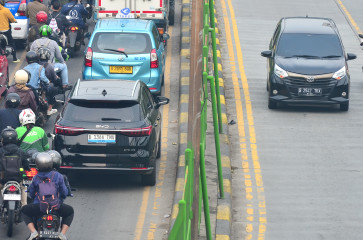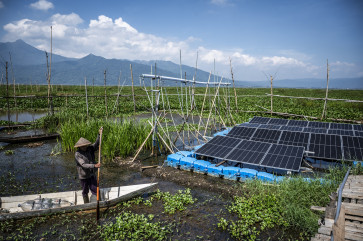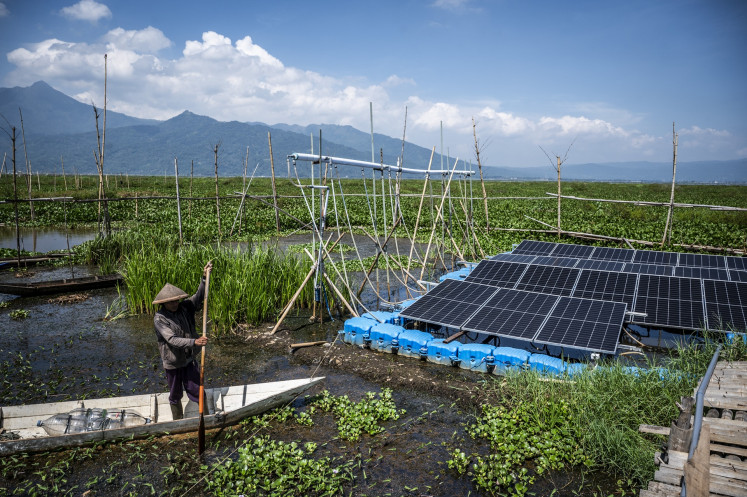Popular Reads
Top Results
Can't find what you're looking for?
View all search resultsPopular Reads
Top Results
Can't find what you're looking for?
View all search resultsPresident breaks tradition, pledges support for BI
President Joko âJokowiâ Widodo broke a tradition as he became the first president to attend the annual Bankersâ Dinner held by Bank Indonesia (BI), in his first encounter with central bank officials since the unexpected interest-rate hike that put his growth target at risk
Change text size
Gift Premium Articles
to Anyone
P
resident Joko 'Jokowi' Widodo broke a tradition as he became the first president to attend the annual Bankers' Dinner held by Bank Indonesia (BI), in his first encounter with central bank officials since the unexpected interest-rate hike that put his growth target at risk.
However, Jokowi did not take the opportunity to lash out at BI's tight-bias policy stance, instead vowing to assist the monetary authority from the fiscal side through an overhaul of the state budget, as well as advancements in infrastructure development.
He vowed to relocate the funds from the poorly targeted fuel subsidies to growth-generating infrastructure projects, ranging from roads and power plants to dams.
In front of BI officials, the President promised that he would be directly involved in the country's infrastructure development. 'Some have asked why a president should be directly involved in permits [for infrastructure projects], but I don't mind doing that,' Jokowi said.
He also stressed the importance of foreign investment in the Indonesian economy, saying that the country could learn from the example of China, a communist country that was able to develop its economy through the assistance of offshore-based capital.
'[The Chinese government] has an amazing mindset, a country that is supposed to be anti-capitalist,' said Jokowi. 'I always stress the importance of infrastructure and investment, particularly foreign direct investment, to our development.'
During his presidential campaign, Jokowi vowed to spur economic growth by 7 percent during his presidency, but this target may prove unattainable due to the central bank's tight-bias monetary policy, which has been blamed for the recent slowdown in growth.
Indonesia's gross domestic product (GDP) grew by only 5 percent in the third quarter of this year, the slowest pace in five years.
As if being blamed for the recent economic slowdown was not enough, BI Governor Agus Martowardojo and his board took the monetary tightening to the next level this week as they unexpectedly hiked the benchmark interest rate by 25 basis points to 7.75 percent.
In his speech, delivered before Jokowi's, the BI governor emphasized that his monetary policy would stay tight-biased in the near future and focus on stability, not economic growth.
The central bank, which is independent of the government, would not decide the course of its monetary policy based only on 'short-term pragmatic interests', said Agus, who is known for his hawkish monetary stance as he has lifted the benchmark BI rate by a cumulative 200 basis points since taking charge last year.
He explained that the latest global financial crisis offered Indonesia a lesson: An economic environment where interest rates were too low encouraged banks to disburse excessive lending, eventually posing risks to the financial system.
The BI governor also announced his ambition to develop local financial markets, including a plan to make Indonesia the world's benchmark for sharia-compliant banking.
Among the central bank's new regulations unveiled by the BI governor to better safeguard the banking system was the implementation of the countercyclical capital buffer (CCB), effective beginning January 2016.
The CCB, a follow-up on the global Basel III banking regulation, will require banks to stockpile extra capital when the economy is in an expansionary business cycle, so that they can have a stronger liquidity buffer during an economic downturn.
DBS Bank economist Gundy Cahyadi said that the President's gesture should be greeted positively by investors, as it showed that BI would no longer be alone in its battle to correct external imbalances, which had been the case in previous years.
'The one-two punch of fuel price hikes and BI-rate hike is a clear sign that both the government and central bank are tolerant of [slower] GDP growth right now, if it means better prospects ahead,' he explained.










